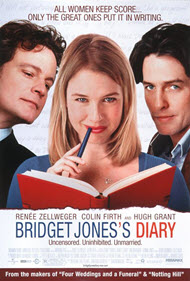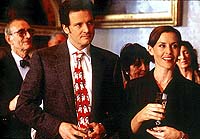Bridget Jones's Diary
 for language and some strong sexuality.
for language and some strong sexuality.
Reviewed by: Barbara Frega
CONTRIBUTOR
| Moral Rating: | Extremely Offensive |
| Moviemaking Quality: |
|
| Primary Audience: | Adults |
| Genre: | Romance Comedy |
| Length: | 1 hr. 34 min. |
| Year of Release: | 2001 |
| USA Release: |
April 13, 2001 (wide) |




TRUE LOVE—What is true love and how do you know when you have found it? Answer

For a follower of Christ, what is LOVE—a feeling, an emotion, or an action? Answer
| Featuring |
|---|
| Renée Zellweger (Renee Zellweger), Hugh Grant, Colin Firth, Jim Broadbent, James Callis |
| Director |
|
Sharon Maguire |
| Producer |
|
Tim Bevan Jonathan Cavendish Eric Fellner |
| Distributor |
Sequel: “Bridget Jones: The Edge of Reason” (2004)
“Bridget Jones’s Diary” is extolled as “zany” and a “character-driven romantic comedy,” and one would think the talents of Renée Zellweger, Colin Firth, and Hugh Grant would promise a rather sweet romantic romp at very least, but in this instance we are presented with coarse and vulgar fare, and characters in a storyline where both are aimless and empty.
Meet Bridget Jones, a thirty-one-year-old publishing-house-marketing-clerk, whose poor self-image is irrevocably hinged to her lack of a romantic relationship. By her own admission, she weighs too much, drinks too much, and smokes too much, and in order to pursue finding a real bona-fide boyfriend, she takes up keeping a diary as a form of resolution against her vices. Did I say a resolution? Well, she’ll keep tabs upon them for the time being, we guess… for there is no apparent effort to restrain any behaviors—not in this film, not by Bridget, nor by anyone else for that matter.
Oddly enough, even while seeking a meaningful and mature relationship (not exactly her adjectives) with a man of character, Bridget seems to have no introspection nor comment to make upon her own untruthfulness, immodesty, promiscuity, general lewdness or her prevailing cynicism towards others. From frame one, we are beset with the truly doubtful notion that she could ever attract anyone at all. (This is not, however the filmmaker’s intention—she is meant to be witty, smart and tragic in a sweet way.) In actuality, she is crude, painfully juvenile, mindlessly rebellious, and profane. In fact, the humor to which the film aspires has very little to do with situation or character and everything to do with vulgarity, especially incessant use of the f-word. (In one instance there’s even a subtitle of the word.) We should expect more from the country that gave us Byron and Shakespeare.
A point should be made about the bad language in this or any film: Bad language or bad behavior per se, doesn’t mean a bad film for those of us seeking art or entertainment with some Godly, uplifting or profound message or values. If so, we would have to eliminate most of the Old Testament as “trashy” or “vile.” Bad language or behavior is sometimes simply indicative of the character’s need for redemption (remember “The Apostle,” “The Bad Lieutenant,” and “Magnolia”). But “Bridget Jones’s Diary” has not a sixteenth of the thematic endeavors of those films. No, it’s hard to assign to this film a loftier aim than its message of merely mindless pleasure-seeking. It is unclear if any character—including Bridget’s “chums”—has any values or principles, and it’s difficult to realize this group of self-absorbed thirty-somethings are at an age when they should be managing, or at least contributing to, the world.
The film’s final violation, then, is its utter pointlessness. it’s simply a vain look at the vain… a verification that those in their thirties have contemporaries who still in their teens. The vulgarity is clearly meant for those who revel in it. If you miss this film, do not fret—you have missed nothing. You might begin a diary of the really awful films you missed…
See our review of the 2004 sequel to this film: Bridget Jones: The Edge of Reason


As soon as I saw the blue string coming out of the drawer for her soup, I was in hysterics. So much I think I missed the joke that went with it. The sex scenes, such that they were, were very tastefully done, in my opinion. There was nothing graphic and hardly any nudity. Not to labor the point too much; I think this film is highly representative of the culture of 20/30 somethings in Britain. it’s not a lifestyle to be emulated certainly, but it’s reality and thank God it can laugh at itself.
[Average / 5]
[Average / 3½]
In some movies, language adds authenticity and seems to fit in (like movies about gangsters, or inner cities). However, the language in “Bridget” was excessive and out of place. It seemed to be more of a novelty than dialog. “Bridget” also lacked smooth plot development, it just kind of jumped around. It is not entirely believable that after such infrequent encounters, that Bridget and Mark Darcy could end up so in love and passionate for each other. (Or perhaps this is a reflection on a society that doesn’t believe courtship is a necessary element of a lasting relationship.) I was also disappointed with the main character herself… Bridget. Now, I think Renee Z. is a great actress, and she did a good job in this movie, BUT… Her character, the heroine, is not much of a heroine. Yes, we can all relate to her. She second guesses herself, she finds herself in stupid embarrassing situations, she humiliates herself in public, and she agonizes over her weight. Who hasn’t? Simply put, Bridget is not the kind of person I would ever aspire to be.
I believe a truly great heroine should be just that—someone you look up to and admire, not simply the girl down the street. Having been “loosely based” on “Pride and Prejudice” I would have liked to see more of Elizabeth Bennet’s self confidence, sharp humor and wit, and intelligence in Bridget, rather than bad habits (excessive smoking and drinking) and self-pity. Although somewhat entertaining, it’s not really worth the price of admission. Wait for Video.
[Extremely Offensive / 2]
[Very Offensive / 1½]
[Average / 2½]
[Average / 3]
Again, I feel that the sex scenes in this movie were uncalled for and unnecessary. But I also thought they were very tastefully done. The brief nudity was very brief and easy to miss. Also, there were no really graphic sex scenes, most of it is implied and not shown at all. it’s sad that Hollywood seems to think a movie can’t be funny and enjoyable unless it has profanity and sex scenes. I think this is pretty much a movie just for adults. It might be okay for older teens, but only if they go with their parents or another adult. it’s sad that Hollywood had to mar such a funny movie with so much profanity.
[Very Offensive / 4]
[Very Offensive / 1½]
[Very Offensive / 1½]
[Very Offensive / 3]
I would recommend this movie, but you need to know before you go that it does have the f-word a LOT of times. A whole lot which was unnecessary. The sex is mostly implied, none of it is graphic. You see them together under the sheets but that is all you see. As for the nudity. That is showed briefly just to show the girl’s horror when she sees him with another woman. I think this movie has a lot to talk about with family, but I definitely would not recommend it for anyone under 15 or 16.
[Very Offensive / 5]
[Average / 4½]


My Ratings: [Very Offensive / 2]